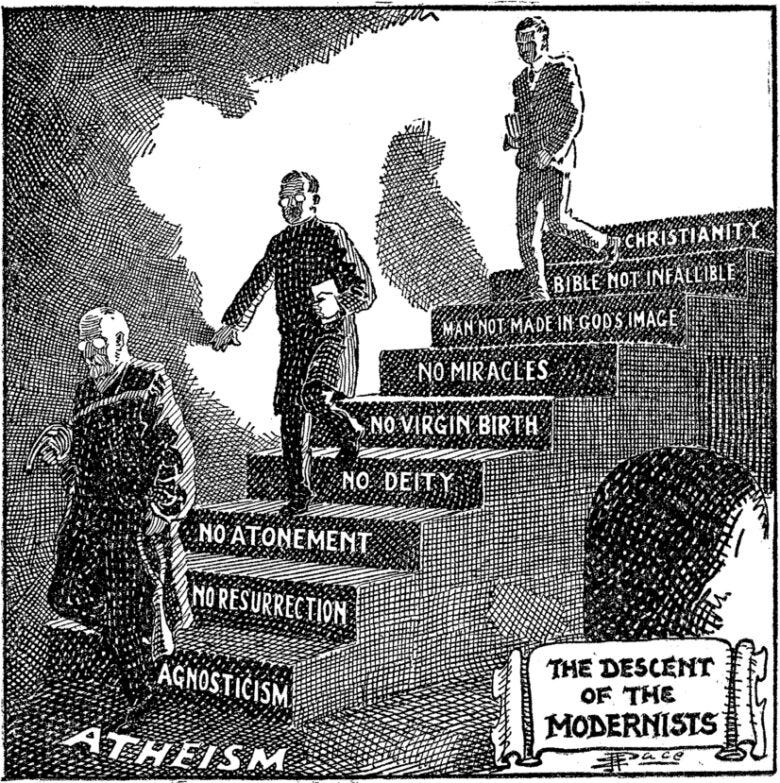Do You Have to Take Genesis Literally to Be Saved?
And does it matter otherwise?
One of the most common yet under discussed doctrinal divisions in the church today concerns whether Genesis 1-11 literally happened as written. Were Adam and Eve historical people? Did Noah exist, and was there a worldwide flood? Did creation happen in six days?
Many theories have been offered in the halls of academia to explain how the Bible wasn’t meant to be taken literally in its earliest chapters:
“Each day was billions of years,” “There was a large gap between ‘the beginning’ and day one,” “God set evolution in motion from the Big Bang onward,” “Genesis was meant to poetically describe God’s relationship with man and wasn’t means at history or science,” “It’s an Ancient Near Eastern framework culminating at Babel,” etc.
I think it’s safe to say that most Christian colleges teach some variation of these non-literal readings. To put my cards on the table, I think they’re dead wrong. It happened the way God said it happened, and I’ll explain why that matters in a minute.
But do you have to take Genesis literally to be saved?
The short answer is no. Salvation is not believing, confessing, repenting, being baptized, and agreeing Adam was a real person. If it were, we would require people to confess that truth at their conversions.
However, that doesn’t mean the issue is of no consequence.
If you’ve read anything from me, you probably know I whole-heartedly reject the “but is it a sin?” question and believe spiritual maturity is about developing discernment.
And, one’s belief about the reality of Genesis can serve as a great litmus test for our discernment.
First, taking Genesis as allegorical or mythical causes real problems in one’s use of the rest of the Bible.
Jesus believed Adam and Noah existed and that the flood happened, and drew on creation order to make important points. And, the fall happening as Genesis 3 described is critical to the Christian faith. In Romans 5, Paul explains how there are two systems—one flowing from Adam, the other from Christ.
If Adam wasn’t a real person who really sinned as Moses described, why was he compared to the real person, Jesus, and His work? It’s like saying “Our nation was once led by Superman and his magical unicorn, until George Washington took it in a different direction after claiming victory at Yorktown.”
Perhaps most importantly, if one rejects the fall and insists man and other creatures came and went for millions of years before literal history began, that means death is a fact of nature and is not due to man’s sin. That’s quite a claim.
Secondly—and this goes doubly for teachers—the pull of respectability is a dangerous one.
If you believe that God created the world thousands and not millions of years ago, in 6 literal days, while hand-making the first two humans and putting them in a garden where they encountered a talking snake, you’re going to be an outlier in the “respectable” corners of academia. While I don’t believe anybody would consciously say that they’re giving up a literal Genesis to keep from being laughed out of rooms they want to occupy, I believe it happens quite easily in the subconscious.
C.S. Lewis wrote on this in his essay on ‘The Inner Ring.’ Discussing the appeal of belonging to some exclusive club and climbing career and social hierarchies, he said, “Of all the passions, the passion for the Inner Ring is most skillful in making a man who is not yet a very bad man do very bad things.”
So, it is a very different thing if someone believes in theistic evolution by default and because they haven’t considered the implications, vs. if they believe in it because “all the smart people do” and “it’s so obvious.”
Paul insisted that Christian teaching would be looked at as foolishness by the world, but that’s not really our concern (1 Corinthians 1:16-31). Once it becomes our concern, compromise begins. This is why it’s so common among the William Lane Craigs of the world to cut corners and make compromises to assure the skeptic that they don’t have to buy the whole thing, just the Gospel. Therein lies the problem:
If a man is embarrassed to be associated with a talking snake or a young earth, he’s all the more likely to cave in on real pressure points like sexual morality and egalitarianism.
The old “Decline of the Moderns” comic got made for a reason. It’s a well-worn path that starts with the desire for cultural or academic respectability and ends in apostasy.
This is not to say that everybody who takes one step will take all of them, or that everyone who compromises on a worldwide flood will automatically compromise on every other point. Rather, the point is that compromise on one point makes compromise on the next one all the more palatable.
Some might look at the image and say that it’s just another case of the slippery slope logical fallacy. But the slippery slope is only a fallacy if there is no principle to explain the downward progression. The principle of compromise in the face of the world calling us stupid and backward is one that can cover the entire slippery slope.
Really, it all comes down to Jesus’ challenge:
“Therefore whoever confesses Me before men, him I will also confess before My Father who is in heaven. But whoever denies Me before men, him I will also deny before My Father who is in heaven.” (Matthew 10:32-33)
So, do you have to, have to, take Genesis 1-11 literally to be saved? No. But be careful of the baggage you might be accepting if you don’t.
Notes
Thanks for reading! I hope you’ll take a second to subscribe to get articles like these in your inbox each week.
I also want to encourage you to subscribe to the podcast feed on your phone (Apple, Spotify, or your favorite podcast platform). There you’ll get the audio editions of my articles and videos delivered right to your phone, free.
And, if you enjoy these articles, please consider sharing them with others and/or becoming a paying subscriber to support my work.
Thanks!
-Jack




My first thoughts in reading the first paragraph or two turned out to be your first point. If you don't believe Genesis 1-11, why would you bother believing the rest of the Bible? And why do some people take such joy in trying not to believe those first chapters and make others not believe them, too? Some people seem to want to make faith harder than it really has to be.
Jack, thank you for this article. You touched upon the idea that if Genesis 1-11 is allegorical, where did sin originate? I've never heard an adherent of theistic evolution offer a scriptural explanation of the origin of sin beyond Genesis 3. I would go so far as to say that theistic evolutionists are in salvific jeopardy. How much of the word can one bring into question or reject and still have God's approval? Syllogistically speaking, Jesus is the word. The word teaches a literal fall of man. Therefore, whoever rejects the word rejects Jesus. After all, Christ referred to "the beginning" as a literal time and event and the creation of man and woman as an instant act of creation (Matthew 19:4).
Lastly, Exodus 20:11 should be considered. Moses said, "For in six days the LORD made the heavens and the earth, the sea and all that is in them, and rested on the seventh day; therefore the LORD blessed the sabbath day and made it holy." The word "days" is the Hebrew word that means a day as defined by evening and morning. One would have to do amazing exegetical gymnastics to get around that reality.